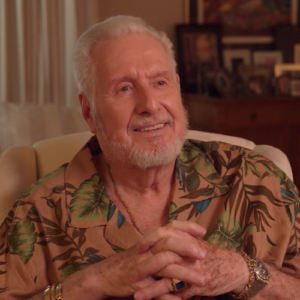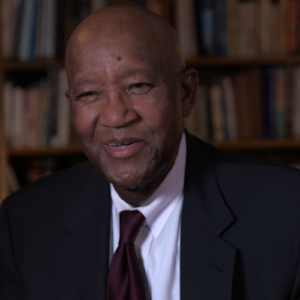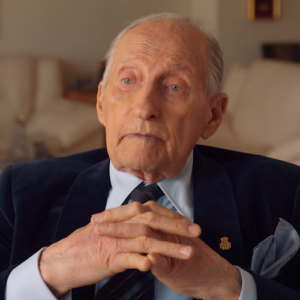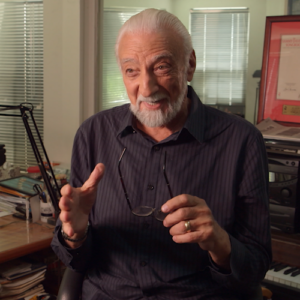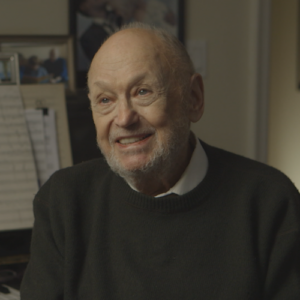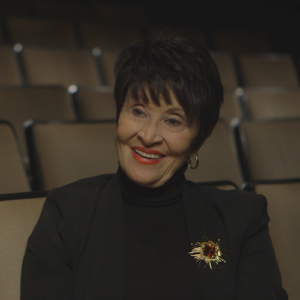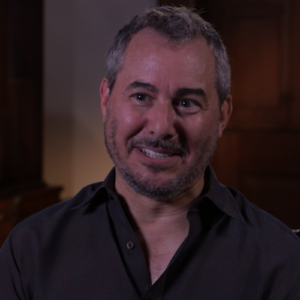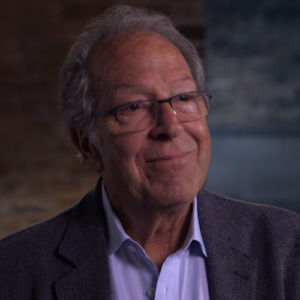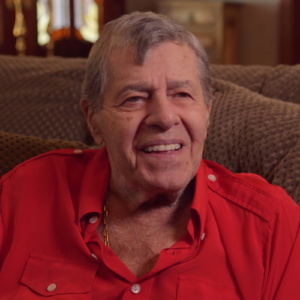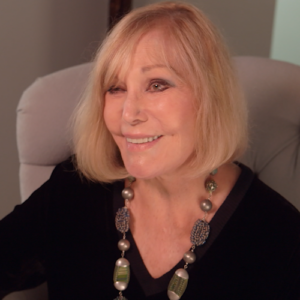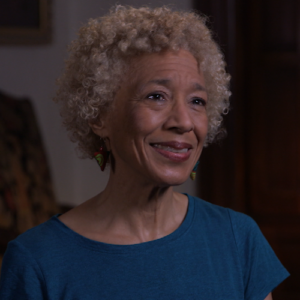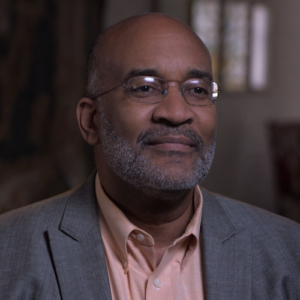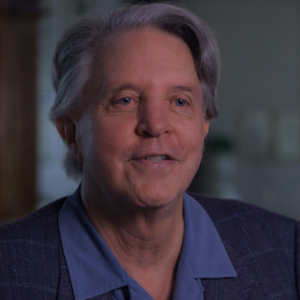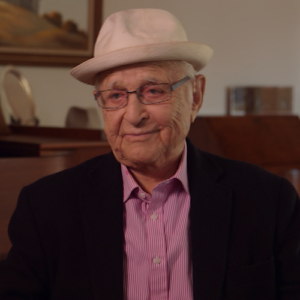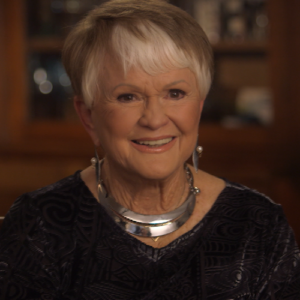Max Rudin: My name is Max RUDIN. I am the publisher of the Library of America, and I have a special interest in the Rat Pack and the Swinging Sixties and what it meant for Americans. And I’m hoping to talk about that a little bit as well.
Interviewer: All right. So quickly, who was Sammy Davis Jr?
Max Rudin: Sammy Davis Junior was a brilliant entertainer and singer who, like many American entertainers, came up through vaudeville. He had a great respect, as many singers did in that period for the American Songbook, as we call it now. And he came up in a period when the social ladder went from white to black and lower to upper class and ethnic to WASP. And he trained himself in a kind of diction and then a kind of approach to singing that were classic.
Interviewer: Great. So what’s your first memory of him?
Max Rudin: My first memory of Sammy Davis, Jr. Is hearing my parents, who were Jewish Americans, talk about him in a specially fond way, as if he were a member of the Jewish poor and that kind of colored. I think my attitude toward him and many people felt that way. He and actually other members of the Rat Pack as well, felt like members of our family in some bizarre way. And there was a special closeness. And we felt that he was some kind of special message that they had for us. I would also say that my other memories of Sammy Davis Jr are about watching his performances and thinking about the aspiration that they embodied, that Sammy’s performances were always heartbreaking in a certain way. There was there was his perfect diction. There was his appeal to the audience to love him, kind of despite his race and his other handicaps. There was something there was kind of a drama of overcoming odds and a drama of assimilation and acceptance that was kind of being played out in his work. And it brought it brought tears to the eyes.
Interviewer: So it was that exceptional to see a black performer when you were growing up have that kind of appeal. Talk about the rarity of that, or was that rare?
Max Rudin: There were there were many black performers performing American songs of that period, obviously. I mean, the whole Tin Pan Alley tradition was basically, you know, interpreted and sold by Jewish and black singers. The thing that was special about Sammy in that period was that he seemed to embody for us something about our hopes and dreams for American life at the time in a special way, something having to do with civil rights movement, something having to do with why, you know, my father had gone off and fought in World War Two, something that had to do with a future America in which white and black and Jew and Italians would be fully accepted as part of the fabric of American life. That seems like an extreme musical thing to say, but in some way that was in part seemed to be embodied for us in in his performances. I grew up in a neighborhood of largely Jewish and Italian-Americans, and my first experience of Sammy was in hearing my parents and their friends talk about Sammy as if he were, in some bizarre way, part of our mission. There was some special closeness that we and their friends and our Italian friends too, seemed to feel about Sammy Davis that set him apart from other performers, I mean, other African American performers, but other performers in a more general way. And there seemed to be some special closeness and some special message that he had for us. I mean, also, you know, if you went to a Catskills hotel, you know, the entertainment was likely to be, you know, Steve and Eddie, you know, a Jewish comic, you know, and Sammy Davis Jr, he was a regular part of the bill in Jewish venues. And that didn’t seem unusual. There seemed to be some special meaning there that had to do with the moment of the early sixties and some kind of shared values and aspirations that he and we shared. You know, the Tin Pan Alley song tradition or the American Songbook, as we now call it, was a tradition of songwriting that was, you know, originally mostly written by Jewish and other recent immigrants who lived in urban ghettos. And it was interpreted at first mainly by Jewish and black singers. You know, you think of Fanny Brice and Al Jolson and Sophie Tucker. You you know, you think of Louis Armstrong and Ethel Waters. And later on, of course, you think of Sarah Vaughan, Billie Holiday and others. The funny thing the interesting about Sammy, of course, is that he was both Jewish and black, uniquely so, and seemed to bridge things in some ways and that in some ways, in that way he embodied that tradition, but also seemed to bridge things that hadn’t been bridged. And yet for all of us had to be bridged. And there, you know, Jews and blacks had a special relationship in that era, as would become clearer during the more public aspects of the civil rights movement. And Sammy seemed to embody that connection in this kind of giddy and happy way.
Interviewer: All right. So Italians, Catholics, Jews and blacks. The Rat Pack? Yes. Can you give us a quick. Just bing, bing, bing. Who they were and what each of them sort of represented. Like a little hit list.
Max Rudin: Yeah. The Rat Pack these days is mainly thought of in terms of entertainment, but at the time the Rat Pack meant something more than that. Here was a show that featured one black, one Jew, two Italians, three of them second generation immigrants, four of them having grown up in urban neighborhoods during the Depression, suddenly taking to the stage and laying claim to American tradition and the right to define what it meant to be cool. Understand that before World War Two, despite the fact that the American song tradition was written and interpreted mainly by blacks, Jews and later on Italians, the fact was that everyone understood that ethnicity and race, to the extent that it could be, was something you had to overcome. It’s to say if you wanted success power class, you had to go from ethnic to us, move up that ladder. You had to go from black to white to the extent that you could. You had to go from a lower class to upper class. This was the classic route that Fred Astaire, Friedrich Austerlitz had taken. This was the classic route that Irving Berlin, Israel, Berlin had taken. And everyone understood that. Case in point, Dino Crocetti, a singing croupier from Steubenville, Ohio, his first job at a chop suey joint on the same bill with Terry’s Wonder Dogs. His name is changed to Dino Martini because the bandleader wants to cash in on the the fad for ethnic singers. Nino martini was big at the time. A year later, when he’s playing classier rooms that would no longer do. And the bandleader says, Look, we have to change your name to Dean Martin. It says why Frank Sinatra didn’t have to change his name. Bandleader says. Freak shot. If Mussolini had marched a year earlier, they would have changed the kid’s name to Frankie Williams. But the reality was that the bandleader was wrong, and in fact, that the War World War Two was starting to change all those rules that, you know, faced with the fight with Nazism, Americans were rethinking their core values of tolerance. And in fact, Frank Sinatra, for one, toured the country, giving lectures in racial and ethnic tolerance to school kids. And in many ways, you know, the Rat Pack, the idea of the Rat Pack, in some ways, many ways, grows out of that gang of mixed race kids to whom Sinatra is giving his inspirational talks. When the Rat Pack hits the stage. They are the sign and the symptom of what the war has done to the American master class system. Here is a group of entertainers at the pinnacle of their careers who are saying we don’t have to be less ethnic to be stylish and successful. And in fact, they’re flaunting their race and ethnicity. You know, that’s that’s the whole that’s the that’s the joke, you know? You know, Joey Bishop, two of the two Italians, you better watch out. I got my own group, the Mafia, you know, or or or when Jack Kennedy is in the audience, you know, Dean Martin picks up. Sammy Davis walks over to him and says, here, you just received this award from the National.
Interviewer: Except up.
Max Rudin: Sammy. He picks up and says, here, you just received this award from the NAACP. So the point of the show was to flaunt ethnicity in a way that proclaimed it. It was a new time that now. Not that now. Style power. Class success. Went along with being black, Jewish, Italian, in fact, that they were truly American because they were black, Jewish or Italian. That was very much the message of the early sixties, I mean, what we now call the swinging sixties.
Interviewer: Sammy Davis Jr could not change. Right, right. And in fact, embraced another ethnicity. So he’s a very he’s he’s the same, but very different. Right.
Max Rudin: Right. Well, we’re the story of the Rat Pack. And in fact, we’re the story of the swinging sixties goes is for a very brief moment, it seemed like. Ethnicity and race were the same. Very brief moment. That’s the giddiness of the swinging sixties and that’s the giddiness of the Rat Pack. It looked for a moment like the war had both had both sent the message that that you had to treat American blacks equally in the same way that you had to treat American Jews and Italians equally. What happened in a few short years was that that fell apart that the the pressures what America, you know, never tired of pointing out to the Rat Pack was that at the end of the day. Ethnicity and race in America were not the same thing. That. Now you have to understand that, you know, the the the rat pack’s inclusion of Sammy in the group was a very bold and progressive political statement. It’s hard to understand that now, but at the time it was extremely daring. I mean, in 19 in 1960, when the Summit Act began in Las Vegas and had only been five years since Sammy Davis at the Last Frontier and Harry Belafonte at the Riviera had actually broken the color line in Las Vegas nightclubs. They were allowed to actually use the facilities rather than having having to be whisked to their rooms right after the show to wait till the next show because the other guests didn’t want to rub elbows with them. That’s only five years before. And you can get a sense of the of the times when through this story that, you know, when Southern guests complained at the Sands that Sammy Davis was using the pool, the management agreed to drain the pool. So this is I mean, this is in the fifties. So in 1960, a mixed race act in show business, even though everyone was a star, was a bold statement. Frank Sinatra had always practiced what he preached about racial and ethnic tolerance. He traveled with African-American musicians. He insisted on equal treatment for them. He insisted on equal pay. So he walked the walk In addition to talking the talk. And the Rat Pack in many ways was an outgrowth of that idea. It was a bold statement and the country was not ready for it in many respects. And Sammy bore the brunt of it When the Rat Pack sang The Star-Spangled Banner in the summer of 1960 at the Democratic National Convention in L.A., Sammy was booed by the Mississippi delegation. He had to fight back tears. Frank whispered to him, Those dirty bastards, don’t let them get to you, Charlie. And it got worse from there. I mean, Sammy postponed his wedding to May Britt, even though invitations had already gone out because it was before the election. He didn’t want to embarrass Frank and Jack through Frank. And, you know, as sad as that was, that was not a paranoid move. I mean, Nixon and the Republicans were making serious political hay out of the fact that Jack’s Jack Kennedy is close. Entourage condoned interracial marriage. It was a big deal. I mean, the saddest aspect of that was that, you know, was when the Kennedys did not invite Sammy to the inaugural ball that was produced by Frank and the other Rat Pack members. And that really hurt again, sending the signal. And, of course, you know, the political reason for that was, of course, that, you know, Democratic victory depended on the southern wing of the party. But the reality was that that America never stopped telling the Rat Pack that. Race and ethnicity were not the same.
Interviewer: So just specifically about about that election, about the 1960 election and what kind of cultural four specific forces were playing.
Speaker 3 Sally and his role in the 60 election was. Hmm.
Max Rudin: Jack Kennedy’s association with the Rat Pack was a huge asset to him during his presidential race against Richard Nixon. The Rat Pack, of course, many of them had come out of those urban neighborhoods that were where the Democratic Party stalwarts came from. They campaigned for him. Of course, his campaign theme song was High Hopes the The Sinatra hit with special lyrics by Sammy Con, and in many ways they represented as an image the progressivism that Kennedy embodied and. As things as the wheel turned. However, Sammy went from being a huge asset on the campaign trail to a liability. I mean, the reality is, was that the Democratic Party victory depended on the support of the southern wing of the party. And as it got closer to the election, Sammy’s involvement, his betrothal to the two May, Britt began to look like potentially potential liability, and they began to distance themselves from. He even postponed the wedding day of his marriage to May Britt because it was going to fall before the election and he was afraid of embarrassing Frank And who was the best man? And through Frank Jack Kennedy. Frank apparently called him on the phone and told him that he didn’t have to postpone his wedding, that in fact, Frank would be there no matter when it was. And he knew that. And Sammy said, Yes, I do know that. But I think this is the best thing to do. It was sad. It was a sad statement, but it was not a paranoid statement. Richard Nixon People had been making serious political hay out of the fact that Jack’s close entourage seemed to condone interracial marriage, and that was something that Kennedy could not afford to have blow up and get away from him.
Interviewer: Fantastic, graceful.
Max Rudin: So in many ways, the Rat Pack was a kind of giddy vision of multi-ethnic, multiracial American democracy. Here were five guys. There was Frank who had come up as a singer through the big bands, have been a star in the forties, had reinvented himself once already in 1953, and was now reinventing himself again. He was the. American urban slum kid turned classic. He was the center piece of the group with him where Dean Martin, a singing croupier from Ohio, who was very much in the Sinatra bel canto mode. Variety even said that they looked alike, which I can say I see. But and Dean kind of acted as a foil to Frank. He he sang songs in what Variety called. Somebody wrote this song, so I might as well sing it attitude. He had kind of a very casual attitude to everything. And in a way, he suggested that the whole American success thing was kind of a racket. And that was a nice foil to Frank. Joey Bishop, who had come up from South Philly as Joey Gottlieb, a son of a bicycle repairman, had been knocking around the vaudeville circuit until Frank spotted him in the early fifties and insisted that Joey be put on the same bill with Frank. Joey had been known as the Crown Prince of Comedy for his kind of sad sack style. Joey was essential to the Rat Pack act. Frank called him the hub of the wheel. He scripted it to the extent that it was scripted, and he kind of he was like the M.C. In between the solo and ensemble terms that the rest of the group did. Frank. Once, when Peter Lawford didn’t want to dress up as a busboy for one of the comic sketches that Joe want him to do, Frank said to him, Do it like Joey says or get off the show.
Speaker 3 Very quickly with Peter Lawford.
Max Rudin: Peter Lawford was a kind of somewhat feckless, somewhat Hollywood ized Brit who had gotten a contract with MGM but had never gotten. I’ve never moved farther than kind of small bit parts. He was a kind of song and dance, man. He Frank seemed to most like the fact of his other. Peter’s other asset, which is that he was married to Jack Kennedy sister. And Frank. Frank always liked associations with with powerful people, organizations. And the extent to which the Kennedy connection was important to Frank can be seen in the the nickname, the Rat Pack nickname he gave Peter, which was brother in law offered. And then there’s Sammy, who, like the others, had come up through vaudeville as a singer, dancer, impressionist. Frank had gotten close to him before World War Two and then waited till after the war and put Sammy’s group that will Mastin trio on the same bill with him at what the Mastin Trio thought was the astonishing salary of 1250 a week. Sammy, in many ways, was the heart of the Rat Pack. Every performance was a drama of of aspiration, of hardships, overcome of. Love me despite my race, Sammy, even more than the others, seem to embody the the aspirational. Elements that were at the heart of the Rat Pack’s appeal.
Interviewer: Great. So Sammy and Frank. So let’s focus let’s drill down a little there. Somebody once said the problem with Sammy is he can’t decide whether he wants to be the black Sinatra or the Jewish Sinatra. What’s what’s their relationship and what was their relationship and what relationship was projected to audiences?
Max Rudin: The relationship between Frank and Sammy Davis Jr is complicated. You know, Frank was early on. His patron helped him get work in the kinds of venues that Frank was playing. And like other members of the Rat Pack. Sammy felt he owed Frank something. So there was a little tension there between the camaraderie and the give and take of the Rat Packs Act and that other power relationship. But on the other hand, they were usually mutually admiring and very close. It’s complicated. Frank’s inclusion of Sammy in the Rat Pack. Was a bold act and something politically and culturally. There were there were very few interracial acts at that at the time. At the same time, if you look at the joking that the Rat Pack does, from our point of view, things stand out. I mean, you know, one joke from the Rat Pack, you know, Joey Bishop’s joke about, you know, I have my own group, the Mafia. That’s one kind of joke. On the other hand, you have Frank Sinatra calling from the wings when Sam is doing his solo turn. Hurry up, Sam. The watermelon is getting cold. Are those jokes equivalent to the audience at the time? Take them as equivalent. It’s impossible to know for us because we’re at the other side of a huge divide in American culture where the other side of the civil rights movement when for us those two things are clearly not equivalent at all. So there’s a tension in the rat packs in the act and in the way that they act, the way that the members relate to each other. You know, in the early sixties, in the very early sixties, I think what came through was the vision of the equality and camaraderie among all these guys. By 1964, three or four or five. What came through, I think, instead was the Amos and Andy jokes, the way Sammy was being used as kind of the comic, but of a lot of the humor. And that’s what stood out. I mean, at the beginning for Sammy, as for everybody else, the point was his own inclusion and his own breaking of racial boundaries. That’s how he saw himself. He the symbolic inclusion of Sammy in the group was the political statement. And it was a it was a progressive and bold statement by 1964. The culture had outrun the Rat Pack. It was no longer a bold statement. And in fact, what it now looked like was not that they were challenging the establishment, but now it looked like they were actually embodying maybe without meaning it some of the same knots, the same racial attitudes that made the establishment the corrupt thing that it was. So, I mean, in many ways it’s the story of the swinging sixties as well. I mean, the the giddiness of the early part of the decade seemed to look forward seemed to look forward to a time of endless successful aspiration. You know, Jews were going to be assimilated, Italians were going to be assimilated. Blacks were going to be assimilated. It was just going to go up and up and up. And that’s what the that’s what the giddiness of the act was about. That’s what the bar cards and the horsing around. I mean, in some ways they look back to the street corner. In other ways, they look forward to a time when. Americans of all kinds are going to be able to relate to each other in this comradely way. What happened was that the Sixties told them of us. That it wasn’t going to be so easy. That at the end of the day. Ethnicity. Meaning white people. As it turned out. As it came to be. And race. Meaning black people. We’re not. We’re not the same. And, you know, the reality was that for Jews and Italians and other white ethnics in this period, ethnicity was coming to be more and more a matter of nostalgia and symbolism and less and less a matter of true identity. For black people. This obviously was not the case. And as that divide became clearer, it ate like an acid into the high spirits of the Rat Pack, and it ate like an acid into the high spirits of the culture. I mean, people like my parents and, you know, that whole optimistic generation that had fought World War Two. And I come back to expect a different kind of American democracy. Understood by the middle of the sixties that that wasn’t going to happen and that it wasn’t going to happen because of race.
Interviewer: Excellent. So you said something really great, 63, 64 when we were watching the clip. You said this must have been before the March on Washington. Right. What’s the tipping point? What’s the point culturally where. It’s not it’s not quite so funny anymore.
Max Rudin: It’s probably the last racially unselfconscious performance of Sammy with Frank. And the Rat Pack is in 1962, where they can they still perform me and My Shadow together, one of their great classic acts without there being feeling any. Overtones of tension. That was probably the last moment. By the summer of 1963. Sammy is in Washington for the March on Washington with Martin Luther King and becomes more and more a committed civil rights activist. He begins more and more as his thinking begins to shift from. Being a pioneer to understanding that racial justice is not about what a few special people might be able to achieve, but what the mass of African-Americans can achieve, and that his breaking the color line, as important as it was in some ways, is not helping the rest of his people. And he understands that he has to take a different kind of position that begins to affect the Rat Pack and the act. I mean, you can see it in in 19. You can see it in 63 through 65. I would say by 1963. You can see he is irked by the by Dean’s epi joke. It’s just not working anymore for him. The audience is a little queasy. You can kind of hear it in their laughter. And by 1965, at the there’s a there’s a benefit that the reduced Rat Pack did. Sammy comes out after having been left backstage a long time and he says, I was back there so long I was thinking about calling some troops which gets again, some nervous titters from the audience. So clearly by that point, the good time, so to speak, the hijinx are over, really. And from then on, the members of the Rat Pack focused more and more on their solo careers and less on their their ensemble act. And Sammy, in fact, after 63, becomes very involved in Golden Boy, which is the Odets play, rewritten as a musical with an interracial romance plot, which is very much indicative of where his head was at the time. And, you know, although the members of the Rat Pack would get together for reunions now and again, it was never really the same after that. It was still great showbusiness, but it was more about entertainment and less about America.
Interviewer: So did the Rat Pack have a quote unquote closing night or they just each drifted in their own ways? Was there what kind of finality was there? Was it just a casual finality?
Max Rudin: But. There wasn’t really a clear closing act to the Rat Pack in 1962. Peter Lawford had the iron door shut on him. Because this is a complicated story, actually. Well, I don’t like to go there.
Speaker 3 Maybe it’s just that that’s okay. It’s not our story.
Max Rudin: Okay. Yeah. In the middle sixties, first Lawford dropped out of the Rat Pack and a reduced Rat Pack performed. And then eventually, you know, the members of the pack got involved in their own solo careers. And then, of course, you know, the big event was the rise of rock and roll in 1964, which again was a case of the sixties outrunning the Rat pack. They went from from seeming. They went from representing progressive cool to representing kind of the dinosaurs of the old culture. What’s interesting is that for a while the two cultures coexisted. You know, when A Hard Day’s Night was number one on the pop charts, and Dean Martin’s son, who was a huge Beatles fan, was listening to it, Dean said to him, I’m going to knock your little palace off the charts. And he recorded Everybody Love Somebody Sometime, which which did Knock Hard Day’s Night off the top of the charts. And, you know, in 1968, just as an example, Reprise Records had three gold records that year. They were Jimi Hendrix, Jimi Hendrix’s Are You Experienced? And two albums by Dean Martin. So it gives you a sense that, you know, things wound down, so to speak, slowly rather than quickly. However, by the end of the sixties, the Rat Pack and its members no longer represented the cutting edge of progressive cool. They had already come to represent everything that was wrong with the establishment, which. From their point of view. They have been storming the barricades just a few years earlier, and that’s how it goes.
Interviewer: Great. I want to get I want to just book. At some point, get back to the basically the roots of it. But this is a quote from James Baldwin in 1960. Yes, I may have. Did I steal it from you? Yes, you did. So so this notion about America’s stolen the opportunity and that equality vanished before the determined will, the friendship of Frank and Sammy Davis proves nothing at all. The determined will is rare, and the inequalities suffered by the many are in no ways justified by the rise of a few. Do you have a sense of how when I see Frank and Sammy together, the word subservient sort of comes up? Any thoughts about how the black community saw that? Certainly. We know how James Baldwin saw it.
Max Rudin: The pioneering inclusion of Sammy in the interracial Rat Pack Act was a bold and progressive move. But it was not always received that way. As the civil rights era approached, but with black intellectuals like James Baldwin and many African-American citizens felt that. The symbolic inclusion of Sammy in this group. Was not enough. It was not going to help them. And Sammy himself reports that, you know, he said people are marching now. You know, I marched alone through those Las Vegas hotels when nobody wanted me there, often to black derision, he said, because for many people, at the end of the day, he was a movie star. And what they saw was not so much his inclusion in the group as his chuckling in some ways to Frank now, you know, everybody chuckled to Frank. So. But and yet and yet. And yet it was different. It was different for Sammy for, you know, some of the reasons that we’ve that we’ve talked about. It was different because at the end of the day, racial relations were a different thing.
Interviewer: Than just a sort of quick little Wikipedia entry. Yeah. On the origins of the Rat Pack and the name. And were they called the clan?
Max Rudin: Yeah. In the late forties, Frank Sinatra moved to the Holmby Hills in L.A., near to Humphrey Bogart. And what was interesting, because in many ways, Frank had modeled his Latter day, which is to say Post From Here to Eternity, macho persona on the kinds of sensitive, tough guys that that Bogart had played in the movies. Bogart included him in a loose association of Confederates drinking buddies around him. And one time they all was, you know, Angie Dickinson and Sammy Kahn and others. One time, they all took the train into Vegas to see Noel Coward perform. Lauren Bacall saw them all there and said, You look like a damn Rat Pack. And then a few years later, a few. Sorry. And a few weeks later in Beverly Hills, she saw them all sitting around the table drinking again. She said, Oh, I see. The rat pack’s all here. So that name kind of stuck for a while. And Humphrey Bogart officially dubbed them the Rat Pack and assigned them various roles. I think Bogart was rat in charge of public relations. So? So they were kind of informally called the Rat Pack. When the act first opened in Vegas in the winter of 1968, it was referred to as the summit, which was a reference to the coming meeting of world leaders. But the press often referred to them in that early period as the Klan, which led to a number of remarks and retorts from the members of the pack itself. Sammy in particular would deadpan to the camera. Do I look like somebody who would be a member of something called the Klan? What happened was that the the the pressures of the coming civil rights movement just made the word Klan too unpalatable. And everybody went back to the Rat Pack. The name that Bogart and Bacall had come up with earlier on. And that stuck.
Interviewer: Fantastic. So you were a Jewish family growing up. Did you see Sammy as one of yours? Sort of. Probably the most tangled cultural relationship in the fifties and sixties is Judaism. And he thought.
Max Rudin: I grew up in a Jewish American family. My father had fought in World War Two. Sammy Davis Junior’s being both black and Jewish. Had a special message for us and and our friends. He seemed to embody. Hopes and dreams about the connection between black Americans and Jewish Americans. Connections which were tangled. They were tangled. You know, Jewish Americans. Many were very committed to the civil rights movement for reasons having to do with having to do with their own our own ethnic past. At the same time as things had transpired, it was often Jewish Americans who owned businesses in black neighborhoods and were often the the first line of resentment for conditions in the urban ghettos. So it was it was complicated. So Sammy’s bringing together of blackness and Jewishness seemed to be a. Almost like a wish fulfillment. He embodied the kind of harmony that. We wished for and we imagined, at least in those early days, was just over the horizon.
Interviewer: So in the famous All the family episode where he goes to the corner of 64 Housing Street, Archie Bunker says, I’ve got a question for you. You’re black. You couldn’t help that You’re colored. You couldn’t help that. But why did you turn Jew? Was there skepticism about that, do you think? Did your family or community feel that or because I sort of remember it growing up as the greatest punch line of all time.
Max Rudin: Sammy Davis is a great punch line from the show was I’m black, I’m Jewish, I’m Puerto Rican. When I move into the neighborhood, I wipe the whole thing out. You know, I don’t think there was skepticism on on the part of, you know, the people that I knew about Sammy’s conversion.
Speaker 3 I just love your follow up on how, on the one hand, he represented the, you know, the coming together of these two beleaguered entities, blacks and Jews. But on the other hand, he was hated by both blacks and whites for different reasons, blacks for his lifestyle. And you touched on this a little bit earlier And and whites were whether it was marrying white woman or just the sort of inherent bigotry that was by far forward, like, how could you do this? And I don’t think we we sort of added that complexity to the conversation.
Max Rudin: It’s the aspirations that Sammy Davis Jr. Represented an embodied by his blackness and Jewishness, his inclusion in the Rat Pack in this multiethnic and multiracial vision of what American democracy might be, what those aspirations. Began to quickly run into the buzzsaw of 1960s politics and the realities of race, class and political power in America. At first, he was criticized from the right. Racist pickets demonstrated because they had heard about his coming interracial marriage with May Britt. He was ultimately shunned by the Democratic Party and administration that he had done so much to help put in office because they could not afford to alienate their southern constituency. And then the tax began to come from the left. The the civil rights movement and intellectuals began to see him as not representative of the mass of black people and in fact, not doing his part to help lift the conditions of the masses of black people in America. So so Sammy very quickly came under fire from many different directions. As the sixties progressed.
Interviewer: It’s a little outside our brief. But Nixon in the seventies.
Max Rudin: As the swinging sixties so-called, began to give way to the sixties, we now think about the late sixties hippie psychedelia and rock and roll. The Rat Pack progressivism was outflanked on the left and they began to look like. Artifacts of an older time, and they’re big and they’re kind of boozy. Fleshy private lives began to seem all of a piece with the very establishment that they had started to critique. What went along with that was a pivot, a cultural pivot on the part of members of the Rat Pack themselves. In 1965, Frank Sinatra. Some ways in response pivots yet again. He was always the one who sense the the winds of cultural change when they were about to shift. He records that life where he borrows the kind of bluesy organ and soulful singing of Ray Charles to create this anthem of white blue collar soul, which is about surviving in the system rather than challenging it or remaking it, which becomes the perfect soundtrack for what was just about to happen, which is to say white post ethnic America was about to pivot from from traditional Democratic progressivism and to Republican neoconservatism. And Fred Frank was right there at that moment. That’s the big cultural change. From there, it’s really a straight line to Sammy Davis, his famous embrace of Richard Nixon in 1972, to ultimately Frank Sinatra’s producing Ronald Reagan’s inaugural ball in 1984, 24 years after he produced Jack Kennedy’s.
Interviewer: Sammy’s being rejected by Kennedy and then embracing Nixon. Yeah, within that, within the space of of, you know, 12 years, that’s you couldn’t be more sort of alpha and omega, right? Yes.
Max Rudin: Sammy Davis Jr and his friends were entertainers at the peak of their careers, but they aspired. To other kinds of authority and power as well. In particular, they aspire to some kind of political recognition. This was behind their cozying up to the Kennedys in the late fifties and sixties, and I think there was an expectation that when Kennedy came into office in 1961 that that was going to be they were going to be officially knighted as the Knights of Camelot. That didn’t happen. It happened to a certain extent for Frank. It did not happen for the others. It didn’t happen to Sammy for sad reasons having to do with his race. He was excluded. He never got the invitation. He never got to be included. And that hurt him deeply. Especially it hurt him when he was disinvited to the inaugural. Danielle, grow ball. Did it hurt him deeply because he felt betrayed by people for whom he had worked? Did it hurt him deeply because he was an entertainer and he felt that he belonged on that stage with Frank and Leonard Bernstein and the others? Who knows? What is clear is that when the Democratic Party was not willing to offer him that stage and that prominence. The Republican Party, it turned out, was Richard Nixon and the Republicans by the end of the sixties and early seventies, were very happy to have Sammy on board. And that was both, I think, flattering and probably felt like. Just deserts in a way, for all the work and all the pain he had been through.
Interviewer: One sort of contextual thing about Emerson, Andy. Yes. Believe it or not, for people who might not know that there’s a lot of that that night. It strikes me as when Sammy goes, you know, the Lone Ranger is going to be lonely. Yeah, he says, Actually, that’s mine. And Dean Martin sort of Bogart’s it. And he also does. Can you talk maybe a little bit about there is a kind of fuzzy line about, you know white guys imitating black characters who made it to the.
Max Rudin: Right part of the give and take and the free for all. And the Rat Pack show was a free use of accents and shtick from Emerson and which was a very popular radio show. Lines like The Lone Ranger are going to be lonely for a long time. That kind of thing was. I shouldn’t do the Amazon Andy thing.
Interviewer: But you could just talk about what it was. It was. Yeah, right.
Max Rudin: Right. Let me start again.
Interviewer: Have a certain. Right. Right. Hmm.
Max Rudin: Part of the warp and worth of the of the kind of free for all. The Rat Pack show was a free use of black dialect and accents from Amazon A&E, which was a popular radio show at the time. That material which. They all seem to be fine with at the beginning of the act again by, you know, the mid sixties. Clearly, Sammy is uncomfortable with it and irked at hearing that kind of language come out of the mouths of Dean Martin and Frank Sinatra. I mean, whether they understood his discomfort at that point, it’s hard to say. You know, famously, you know, two weeks after the March on Washington in 1912, 1963, they were back in Vegas doing a show and Dean Martin adlibbed. Hell, I wouldn’t march even if the Italians were marching. So there was a probably a less than clear understanding on the part of some members of the act about the momentous ness of the events that were going on.


